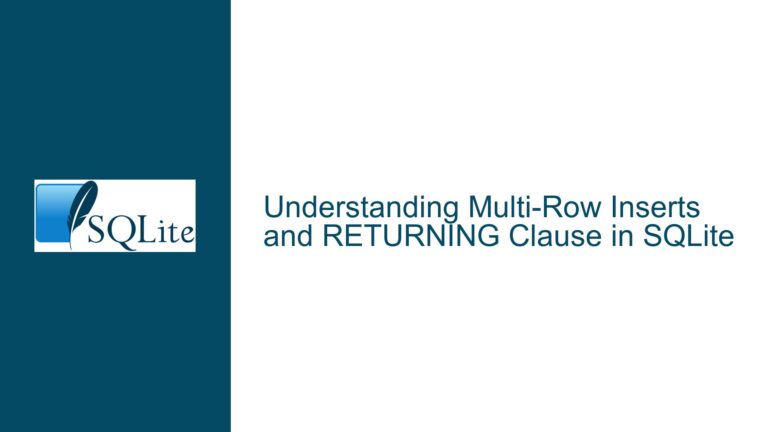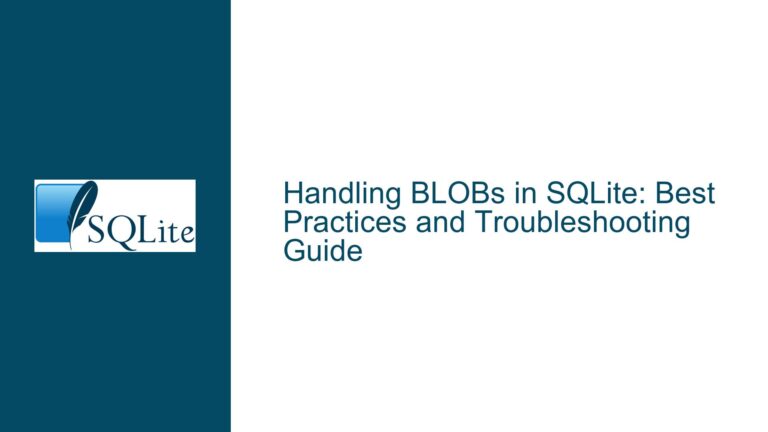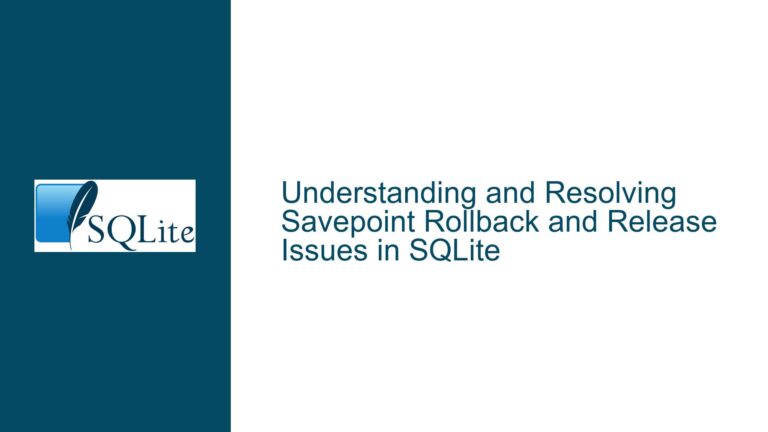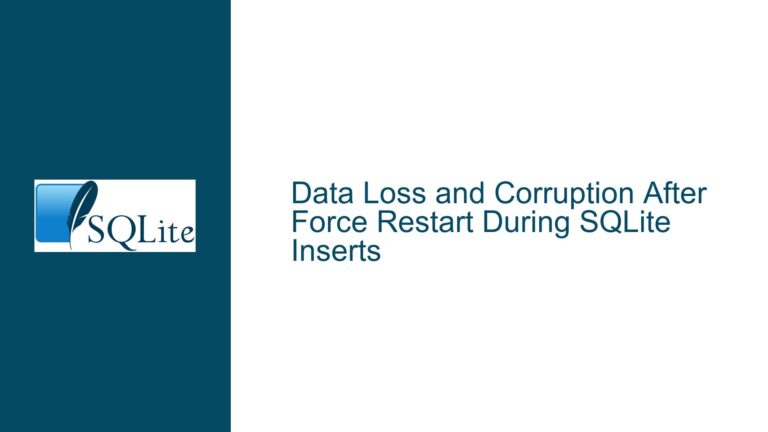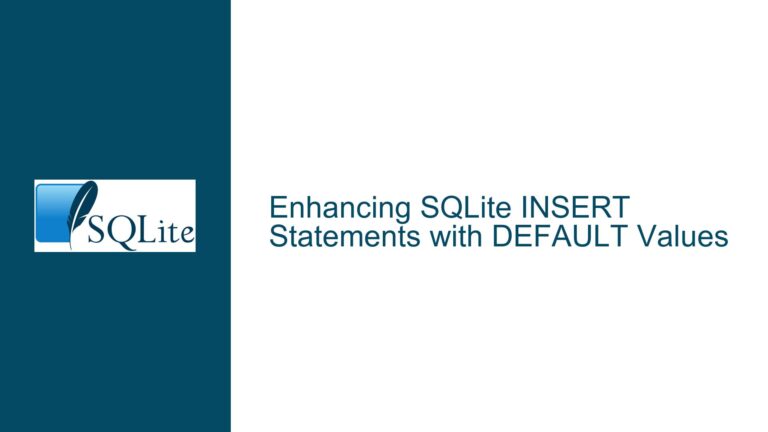Handling Double Quotes in SQLite TSV Imports: Escaping Rules and CSV Mode Misconceptions
Issue Overview: CSV Mode Parsing Conflicts with TSV Field Delimiters and Quotation
When importing Tab-Separated Value (TSV) files into SQLite using .mode csv with .separator "\t", users may encounter warnings such as "unescaped " character" or observe incomplete data ingestion. These issues arise when fields contain double quotes (") that are not properly escaped according to CSV/TSV conventions. SQLite’s CSV importer adheres to RFC 4180 standards for parsing, even when the field delimiter is changed to a tab character. This means double quotes within fields must follow specific escaping rules, such as doubling them (""), to avoid syntax conflicts. Misunderstanding this behavior leads to malformed imports, where fields are truncated or misinterpreted. The problem intensifies when users attempt to "fix" warnings by adding non-standard escape characters (e.g., \"), which bypass SQLite’s CSV parser but introduce inconsistencies with formal specifications.
Possible Causes: RFC 4180 Non-Compliance and Delimiter Misconfiguration
1. Improper Field Quoting and Escaping in TSV Files
SQLite’s CSV parser expects fields containing double quotes, field delimiters (e.g., tabs), or line breaks to be enclosed in double quotes. Internal double quotes must be escaped as "". For example, the field "Ovidius" University must be written as """Ovidius"" University" in CSV/TSV. If unescaped quotes exist, the parser misinterprets field boundaries, leading to warnings or data corruption.
2. Confusion Between CSV and TSV Handling
While .separator "\t" changes the delimiter to a tab, SQLite’s .mode csv still enforces CSV-style quotation rules. Users often assume TSV files follow distinct parsing logic (e.g., ignoring quotes), but SQLite treats TSV as a variant of CSV with a tab delimiter. This mismatch causes unexpected behavior when unquoted fields contain reserved characters like ".
3. Backslash Escaping as a Non-Standard Workaround
Adding a backslash (\") suppresses warnings because SQLite’s parser ignores unrecognized escape sequences in non-string contexts. However, this violates RFC 4180 and creates invalid field content, such as literal backslashes in the imported data. The parser may skip subsequent lines or misalign columns due to improper quotation.
4. Ambiguity in Line Endings and Field Boundaries
TSV files with inconsistent line endings (e.g., mixed \r\n and \n) or unescaped newlines within fields can cause the parser to prematurely terminate record ingestion. Fields spanning multiple lines require enclosing quotes and proper escaping, which are often overlooked.
Troubleshooting Steps, Solutions & Fixes: RFC-Compliant TSV Formatting and SQLite Configuration
Step 1: Validate and Correct TSV File Structure
Ensure fields containing tabs, double quotes, or newlines are enclosed in double quotes, with internal quotes escaped as "":
Non-Compliant Example:
ISSN TITLE
2286-038X "Ovidius" University Annals of Chemistry.
RFC-Compliant Fix:
ISSN TITLE
2286-038X """Ovidius"" University Annals of Chemistry."
Use tools like csvkit (csvclean) or text editors with syntax highlighting to identify unescaped quotes.
Step 2: Configure SQLite for Strict RFC 4180 Compliance
Force SQLite to interpret quotes correctly by combining .mode csv with explicit delimiters:
.mode csv
.separator "\t"
.import --csv data.tsv my_table
The --csv flag ensures quote handling follows RFC 4180, even with custom separators.
Step 3: Avoid Backslash Escaping in TSV Files
Replace \" with standard "" escapes. For example:
# Incorrect: Uses backslash escape
sed -i 's/"/\\"/g' data.tsv
# Correct: Uses RFC-compliant double quotes
sed -i 's/"/""/g' data.tsv
Step 4: Handle Fields with Line Breaks or Tabs
Enclose multi-line fields in quotes and escape internal quotes:
1224-581X "Analele ştiinţifice ale Universităţii ""Al.I. Cuza"" din Iaşi
A multi-line field."
Step 5: Verify Import Results with SQL Queries
After importing, check for truncated fields or misalignments:
SELECT * FROM my_table WHERE TITLE LIKE '%"%';
Look for unexpected backslashes or missing data.
Step 6: Use .mode tabs for Non-CSV TSV Files
If your TSV file does not use quotes (even for fields with special characters), switch to tab mode:
.mode tabs
.import data.tsv my_table
Caution: This disables quote handling entirely. Fields containing tabs or newlines will corrupt the import.
Step 7: Preprocess TSV Files for SQLite Compatibility
For complex files, use scripting languages (Python, Perl) to enforce RFC 4180 rules:
import csv
with open('data.tsv', 'r') as infile, open('fixed.tsv', 'w') as outfile:
reader = csv.reader(infile, delimiter='\t')
writer = csv.writer(outfile, delimiter='\t', quoting=csv.QUOTE_MINIMAL)
for row in reader:
writer.writerow(row)
Step 8: Address Character Encoding Conflicts
Ensure TSV files use UTF-8 encoding to prevent parsing errors with special characters:
iconv -f ISO-8859-1 -t UTF-8 data.tsv > data_utf8.tsv
By adhering to RFC 4180 standards and configuring SQLite’s CSV mode appropriately, users can resolve quotation-related import errors and ensure reliable ingestion of TSV data.

